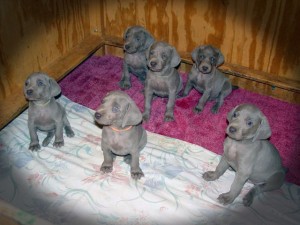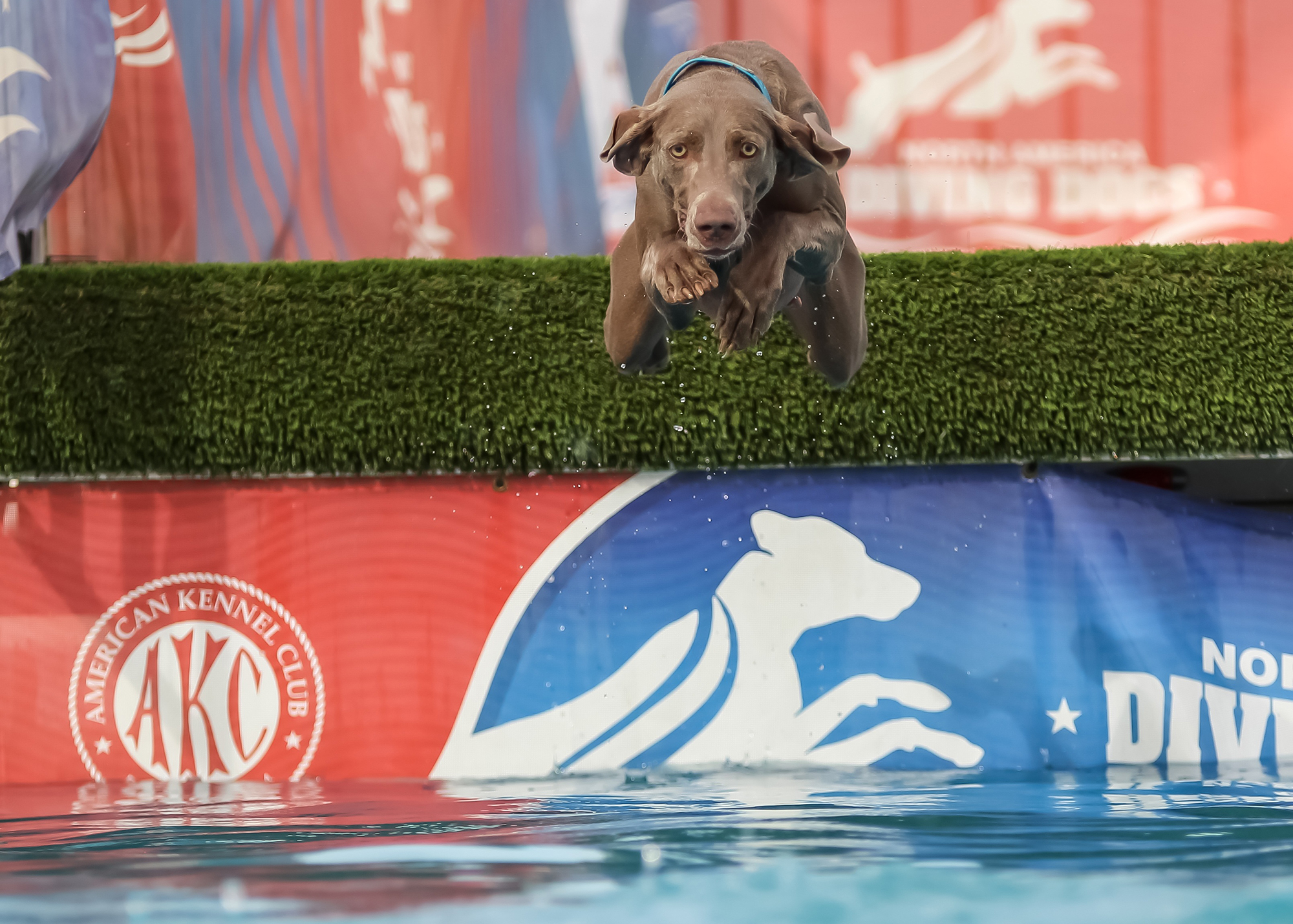The American Kennel Club Standard for the Weimaraner Breed
 General Appearance
General Appearance
A medium-sized gray dog, with fine aristocratic features. He should present a picture of grace, speed, stamina, alertness and balance. Above all, the dog’s conformation must indicate the ability to work with great speed and endurance in the field.
Height
Height at the withers: dogs, 25 to 27 inches; bitches, 23 to 25 inches. One inch over or under the specified height of each sex is allowable but should be penalized. Dogs measuring less than 24 inches or more than 28 inches and bitches measuring less than 22 inches or more than 26 inches shall be disqualified.
Head
Moderately long and aristocratic, with moderate stop and slight median line extending back over the forehead. Rather prominent occipital bone and trumpets well set back, beginning at the back of the eye sockets. Measurement from tip of nose to stop equals that from stop to occipital bone. The flews should be straight, delicate at the nostrils. Skin drawn tightly. Neck clean-cut and moderately long. Expression kind, keen and intelligent. Ears-Long and lobular, slightly folded and set high. The ear when drawn snugly alongside the jaw should end approximately 2 inches from the point of the nose. Eyes-In shades of light amber, gray or blue-gray, set well enough apart to indicate good disposition and intelligence. When dilated under excitement the eyes may appear almost black. Teeth-Well set, strong and even; well-developed and proportionate to jaw with correct scissors bite, the upper teeth protruding slightly over the lower teeth but not more than 1/16 of an inch. Complete dentition is greatly to be desired. Nose-Gray. Lips and Gums-Pinkish flesh shades.
Body
The back should be moderate in length, set in a straight line, strong, and should slope slightly from the withers. The chest should be well developed and deep with shoulders well laid back. Ribs well sprung and long. Abdomen firmly held; moderately tucked-up flank. The brisket should extend to the elbow.
Coat and Color
Short, smooth and sleek, solid color, in shades of mouse-gray to silver-gray, usually blending to lighter shades on the head and ears. A small white marking on the chest is permitted, but should be penalized on any other portion of the body. White spots resulting from injury should not be penalized. A distinctly long coat is a disqualification. A distinctly blue or black coat is a disqualification.
Forelegs
Straight and strong, with the measurement from the elbow to the ground approximately equaling the distance from the elbow to the top of the withers.
Hindquarters
Well-angulated stifles and straight hocks. Musculation well developed.
Feet
Firm and compact, webbed, toes well arched, pads closed and thick, nails short and gray or amber in color. Dewclaws-Should be removed.
Tail
Docked. At maturity it should measure approximately 6 inches with a tendency to be light rather than heavy and should be carried in a manner expressing confidence and sound temperament. A non-docked tail shall be penalized.
Gait
The gait should be effortless and should indicate smooth coordination. When seen from the rear, the hind feet should be parallel to the front feet. When viewed from the side, the topline should remain strong and level.
Temperament
The temperament should be friendly, fearless, alert and obedient.
FAULTS
Minor Faults
Tail too short or too long. Pink nose.
Major Faults
Doggy bitches. Bitchy dogs. Improper muscular condition. Badly affected teeth. More than four teeth missing. Back too long or too short. Faulty coat. Neck too short, thick or throaty. Low-set tail. Elbows in or out. Feet east and west. Poor gait. Poor feet. Cowhocks. Faulty backs, either roached or sway. Badly overshot, or undershot bite. Snipy muzzle. Short ears.
Very Serious Faults
White, other than a spot on the chest. Eyes other than gray, blue-gray or light amber. Black mottled mouth. Non-docked tail. Dogs exhibiting strong fear, shyness or extreme nervousness.
DISQUALIFICATIONS
Deviation in height of more than one inch from standard either way. A distinctly long coat. A distinctly blue or black coat. Approved December 14, 1971
Taken from the American Kennel Club web site.
